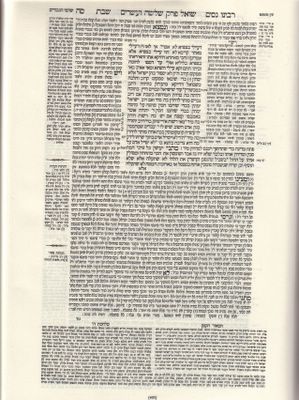
HIDE/SHOW IMAGE
65a
{Shabbat 151a continues}
that it entered {the city} in the morning, we do not say that if it had not come from a close place, it would not have entered in the morning, but rather we say that this came from a far place, and this that it entered in the morning - {well,} at night it came until the wall, and his house there, and it is entering now. {this according to Shmuel}
And what is meant by UNLESS THEY CAME FROM A NEAR PLACE {in the Mishna}? This is what it means to say? One should not bewail an Israelite on them until he waits enough time {after Shabbat} to bring it from a from a close place.
And the halacha is like Shmuel, for we analyze the Mishna like him, for we learn in masechet Machshirin {Mishna 2:5, this citation occurs on our daf, however}: If a city inhabited by Israelites and Gentiles contains baths where there is bathing on Shabbat, if the majority are Gentiles, one [an Israelite] may bathe therein immediately; if the majority are Israelites, one must wait until hot water could be heated. Half and half, one must wait until hot water could be heated. Rabbi Yehuda says, in a small tub, if there is a רשות there, he may bathe therein immediately. What is a רשות? Rav Yitzchak the son of Rav Yehuda said: such as an important person, who possesses ten slaves who heat ten kettles [of water] for him simultaneously, then if it is a small bath he [the Israelite] may bathe therein immediately {since they could have heated the water in this way immediately after Shabbat}.
{Eruvin 38b}
The Sages learnt {in a brayta}: A man should not tour his field {on Shabbat; our gemara: to the end of his field} to see what it needs. Similarly, a man should not walk about the gate of a province in order that when it becomes dark {on Saturday night} he can enter the bathhouse immediately.
{Shabbat 151a resumes}
MISHNA:
ALL THE REQUIREMENTS OF THE DEAD MAY BE DONE {on Shabbat};
HE MAY BE ANOINTED WITH OIL AND WASHED, PROVIDED THAT NO LIMB OF HIS IS MOVED.
THE PILLOW MAY BE REMOVED FROM UNDER HIM,
AND HE MAY BE PLACED ON SAND, IN ORDER THAT
{Shabbat 151b}
HE MAY BE ABLE TO KEEP {until the funeral without putrefying}.
THE JAW MAY BE TIED UP, NOT IN ORDER THAT IT SHOULD CLOSE BUT THAT IT SHOULD NOT GO FURTHER [OPEN].
AND LIKEWISE, IF A BEAM IS BROKEN, IT MAY BE SUPPORTED BY A BENCH OR BED STAVES, NOT IN ORDER THAT IT [THE BREAK] SHOULD CLOSE UP, BUT THAT IT SHOULD GO NO FURTHER.
It's been a while...
-
I've been blogging a bit on Substack, at Scribal Error. While focused more
on gemara and girsaot, I just had a post on Rationalism and Midrash. Check
ou...
1 year ago



No comments:
Post a Comment